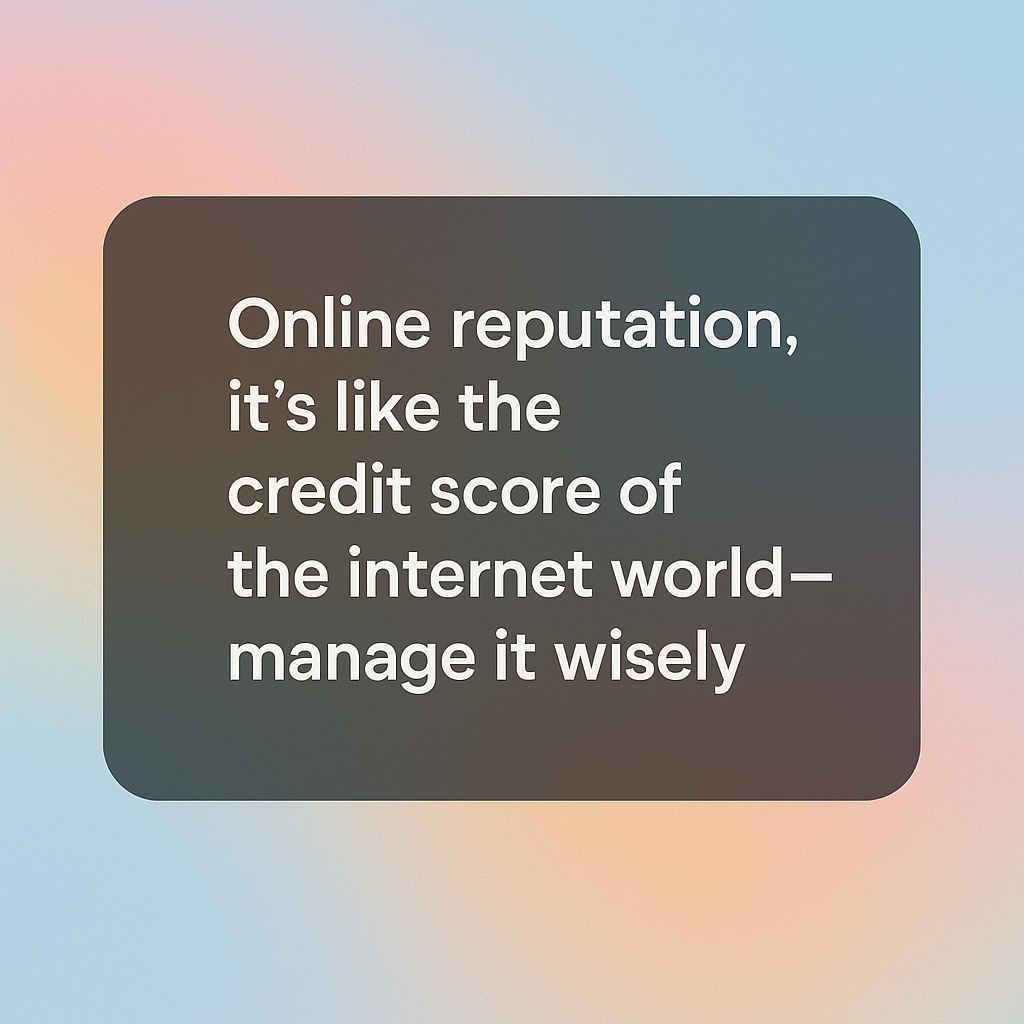
Every click and comment leaves a permanent mark in the digital world. Around 70 percent of companies now perform detailed online background checks when hiring. You might think this digital fingerprint is just noise among endless internet chatter, but it actually shapes your chances at jobs, trust, and even your bottom line in ways that surprise most people.
Table of Contents
- Defining Online Reputation: What It Is And Its Elements
- The Importance Of Online Reputation In Today’s Digital World
- How Online Reputation Influences Trust And Credibility
- Key Factors Affecting Online Reputation And Management Strategies
- Real-World Examples: How Reputation Shapes Success
Quick Summary
| Takeaway | Explanation |
|---|---|
| Online reputation shapes professional opportunities. | Digital presence significantly influences hiring decisions and career advancements. Companies now conduct thorough online checks during recruitment. |
| Manage reputation proactively to build credibility. | Regular monitoring and authentic representation online are crucial for establishing trust with potential clients and partners. |
| Negative feedback can seriously harm reputation. | Addressing criticism constructively and swiftly is essential to mitigate potential damage and maintain a positive image. |
| Digital reputation functions as currency. | A strong online presence directly correlates with perceived reliability and professional value in the digital marketplace. |
| Strategic content sharing enhances reputation. | Regularly producing quality content relevant to your field showcases expertise and fosters credibility among audiences. |
Defining Online Reputation: What It Is and Its Elements
Online reputation represents the collective digital perception about an individual, business, or brand formed through internet interactions and digital content. Unlike traditional reputation, which developed through personal interactions and word of mouth, online reputation emerges from diverse digital touchpoints that instantaneously shape public opinion.
Core Components of Online Reputation
Online reputation consists of multiple interconnected elements that collectively construct a comprehensive digital profile. According to research from the European Commission, these critical components include:
- Search engine results displaying information about an entity
- User-generated reviews and ratings across platforms
- Social media mentions and interactions
- Professional network profiles and recommendations
- News articles and media coverage
- Blog posts and commentary
Digital Perception Mechanics
The mechanics of online reputation involve continuous assessment and aggregation of digital signals. Every online interaction contributes to this dynamic ecosystem, where positive and negative content can rapidly influence public perception. Search algorithms analyze these signals, creating a cumulative representation that potential clients, employers, or partners might encounter.
Reputation Impact Zones
Online reputation extends beyond mere digital visibility. It directly influences critical decision making processes across professional and personal domains. Potential consequences include:

- Career opportunities and professional advancement
- Business credibility and client trust
- Personal brand perception
- Financial opportunities and investment potential
- Social and professional network connections
Understanding online reputation requires recognizing its fluid and multifaceted nature. Each digital interaction serves as a potential reputation building or reputation modifying moment, making conscious digital engagement increasingly important for individuals and organizations alike.
To clarify the crucial building blocks of online reputation discussed in the article, the following table summarizes its key components and their functions.
| Component | Description |
|---|---|
| Search engine results | Publicly accessible information influencing first impressions |
| User-generated reviews and ratings | Crowd-sourced feedback shaping trust and credibility |
| Social media mentions and interactions | Real-time engagement and sentiment signals |
| Professional network profiles | Evidence of expertise, connections, and recommendations |
| News articles and media coverage | Formal assessments published by third parties |
| Blog posts and commentary | Informal thought leadership and reputation narratives |
The Importance of Online Reputation in Today’s Digital World
Online reputation has transcended from being a peripheral concern to a critical asset in personal and professional domains. In an era where digital interactions dominate communication, an individual’s or organization’s online presence can significantly determine opportunities, credibility, and overall success.
Digital Trust and Credibility
According to research from the National Library of Medicine, digital platforms have fundamentally transformed how trust is established and maintained. The online reputation serves as a primary mechanism through which potential employers, clients, partners, and networks evaluate an entity’s reliability and competence. This digital reputation acts as an instantaneous credential system, providing immediate insights into an individual’s or organization’s professional standing.
Key factors influencing digital trust include:
- Consistency of professional representation
- Quality and authenticity of shared content
- Responsiveness and engagement in digital spaces
- Transparency of professional achievements
- Endorsements and recommendations from credible sources
Professional and Personal Opportunity Gatekeeping
Online reputation functions as a sophisticated gatekeeping mechanism that can either unlock or restrict potential opportunities. In professional contexts, recruiters and hiring managers routinely conduct digital background checks, using online profiles as supplementary evaluation tools. Similarly, potential clients assess service providers through their digital footprint, making a robust online reputation crucial for business development.
Reputation Management as Strategic Necessity
Effective online reputation management has evolved from an optional strategy to a strategic necessity. Proactive digital presence management involves:
- Regular monitoring of digital mentions
- Developing a consistent and authentic online narrative
- Addressing negative feedback constructively
- Creating high quality, relevant digital content
- Building a network of professional and credible connections
The digital landscape continues to reshape how individuals and organizations are perceived, making online reputation an invaluable intangible asset. Understanding and strategically curating this digital representation is no longer a choice but a fundamental requirement for success in interconnected professional environments.
How Online Reputation Influences Trust and Credibility
Online reputation serves as a powerful mechanism that transforms digital interactions into measurable trust signals. In an interconnected digital ecosystem, these reputation signals play a critical role in how individuals and organizations are perceived, evaluated, and ultimately trusted by potential clients, partners, and networks.
The Psychology of Digital Trust
According to research from Frontiers in Psychology, digital reputation acts as a sophisticated trust proxy that replaces traditional face-to-face credibility assessment. When direct personal interactions are limited, online reputation becomes the primary lens through which trustworthiness is determined.
Key psychological trust mechanisms include:
- Social proof through visible endorsements
- Consistency of digital professional representation
- Transparency of achievements and credentials
- Quality and authenticity of shared content
- Responsiveness and engagement patterns
Reputation as a Credibility Currency
In the digital marketplace, reputation functions as a form of intangible currency. Positive online presence translates directly into perceived competence, reliability, and professional value. Potential clients and collaborators use these digital reputation indicators to make rapid assessment and decision making about engagement potential.
Critical reputation evaluation criteria encompass:
- Professional background verification
- Quality of client testimonials
- Demonstration of expertise through content
- Consistency across different digital platforms
- Network connections and professional associations
Trust Signal Amplification
Online reputation operates as a dynamic, self-reinforcing system where positive interactions generate increased trust signals. Each validated professional interaction, positive review, or meaningful digital contribution incrementally enhances an individual’s or organization’s credibility profile. The cumulative effect creates a robust digital reputation that can significantly influence professional opportunities and network expansion.
The intricate relationship between online reputation and trust underscores the critical importance of intentional, strategic digital presence management. In an era where digital interactions increasingly mediate professional relationships, cultivating a strong, authentic online reputation is not just beneficial but essential for sustained success.
Key Factors Affecting Online Reputation and Management Strategies
Online reputation represents a complex digital ecosystem where multiple interconnected factors simultaneously influence public perception. Understanding these elements provides critical insights into effective reputation management and strategic digital presence development.
Core Influencing Elements
According to research from the National Institutes of Health, online reputation emerges from a sophisticated interaction of digital signals and user-generated content. These core influencing elements create a comprehensive digital narrative that potential audiences interpret and evaluate.
Key factors shaping online reputation include:
- Volume and sentiment of user reviews
- Visibility and ranking in search engine results
- Quality and frequency of professional content sharing
- Social media engagement and interactions
- Network connections and professional endorsements
Reputation Risk Assessment
Reputation management involves continuous monitoring and strategic intervention. Digital platforms provide unprecedented transparency, allowing real time tracking of reputation signals. Professionals and organizations must develop robust assessment mechanisms that can quickly identify potential reputation risks and implement proactive mitigation strategies.
Critical reputation risk zones encompass:
- Negative customer or client feedback
- Controversial social media interactions
- Outdated or inaccurate professional information
- Inconsistent digital brand messaging
- Potential conflicts or unresolved professional disputes
Proactive Management Strategies
Successful online reputation management requires a holistic and dynamic approach. This involves creating a deliberate digital strategy that emphasizes authenticity, consistent professional representation, and strategic content development. The goal is not just to manage perception but to build a genuine, credible digital identity that reflects professional expertise and values.
Effective reputation management transcends defensive tactics. It represents a strategic opportunity to showcase professional capabilities, build trust, and create meaningful digital connections that can translate into tangible professional opportunities and network expansion.
Real-World Examples: How Reputation Shapes Success
Online reputation has transformed from an abstract concept to a tangible factor directly influencing professional opportunities, business growth, and individual success. Real world scenarios demonstrate how digital perception can dramatically impact career trajectories and organizational performance.
Professional Opportunity Pathways
According to research from EDUCAUSE Review, approximately 70% of companies now utilize comprehensive online background checks during recruitment processes. This digital vetting goes far beyond traditional resume screening, examining an individual’s entire digital footprint to assess professional credibility and cultural fit.
Critical professional reputation evaluation points include:
- Consistency of professional narrative across platforms
- Quality and relevance of shared professional content
- Network connections and endorsements
- Demonstrated expertise through digital interactions
- Public professional achievements and recognition
Business Reputation Transformation
Small and medium enterprises demonstrate how strategic online reputation management can create significant competitive advantages. By understanding digital perception mechanisms, businesses can transform their online presence from a passive reflection to an active brand building tool.
Key business reputation development strategies involve:
- Proactive customer engagement
- Transparent communication
- Rapid and constructive response to feedback
- Consistent brand messaging
- Strategic content marketing
Digital Trust as Career Capital
Individuals who strategically manage their online reputation can leverage digital platforms as powerful professional acceleration tools. Each carefully curated digital interaction becomes a potential opportunity gateway, allowing professionals to showcase skills, build networks, and attract meaningful collaborations.

The modern professional landscape recognizes digital reputation as a critical form of intangible career capital. Success increasingly depends not just on traditional qualifications, but on the ability to authentically represent professional value through strategic digital presence management.
Ready to Take Control of Your Online Reputation?
Building a trustworthy online reputation is no longer optional—it’s the foundation of growth for solopreneurs and freelancers today. The article highlighted how every review, client interaction, and piece of digital content can impact your credibility and open doors—or close them. If you are struggling to consistently present a strong online image or to manage all moving pieces of your client journey, it is easy to feel overwhelmed and worry about missing out on opportunities for business growth.

Imagine a simple solution designed just for service providers like you. Fluum.ai acts as your AI-powered co-founder by consolidating everything from bookings and payments to marketing and reputation management in one place. Use proven templates and guides to boost your visibility and run your business with confidence. Take the next step now and see for yourself how easy it is to turn a positive online reputation into lasting success. Visit Fluum.ai pricing and get started today.
Frequently Asked Questions
What is online reputation?
Online reputation refers to the collective digital perception of an individual, business, or brand, shaped by interactions and content available on the internet.
Why is online reputation important in today’s digital world?
Online reputation is crucial as it influences trust, credibility, and opportunities in professional and personal contexts, particularly in hiring and business dealings.
How can individuals effectively manage their online reputation?
Individuals can manage their online reputation by regularly monitoring digital mentions, maintaining a consistent online narrative, proactively engaging with feedback, and producing quality digital content.
What factors influence online reputation?
Key factors influencing online reputation include user-generated reviews, search engine results, social media interactions, professional endorsements, and the quality of content shared online.
Recommended
- Fluum | What is Client Leaderboard Features for Online Training
- Fluum | What is Online Course Tools for Meal Planning and Gut Health
- Fluum | What is Online Course Platforms for Personal Trainers
- Fluum | What is Retargeting Ads for Dropped Fitness Leads
- Fluum | 7 Must-Have Productivity Apps for Freelancers
- Comprendere la tutela della reputazione online in Italia • Gio Talente
- Understanding Online Reputation Management for Businesses – Digital PR Expert | Digital Marketing & Search Leaders



